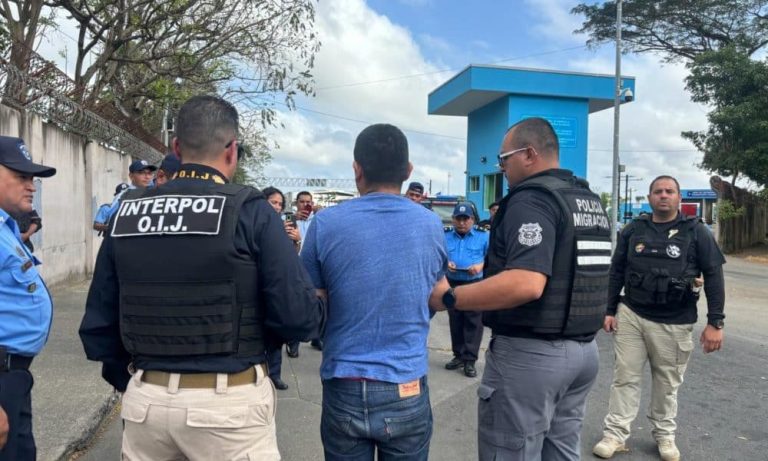20 de febrero 2024

Children of Exile: The Births “Sowing Hope” in the Camp of Nicaraguan Farmers

PUBLICIDAD 1M
PUBLICIDAD 4D
PUBLICIDAD 5D
Costa Rican Constitutional Court accepted the defense's writ of habeas corpus, but only after the prisoner was handed over to Nicaragua

On Friday, February 16, Costa Rican authorities extradited Douglas Perez to Nicaragua. Perez, known as Douglas Alvarez or by his alias "Relámpago" ("Lightning") is a former member of the "contra", or Nicaraguan Resistance, and one of two opposition figures wanted by the Daniel Ortega-Rosario Murillo regime.
The regime accuses Alvarez of participating in the murder of a policewoman and a civilian. His alleged accomplice, Reinaldo Picado, alias "Comandante Omar" and also a former member of the Nicaraguan Resistance, is still imprisoned in Costa Rica.
The extradition occurred less than six months after a judge of the Trial Court in Puntarenas and the Court of Appeals in Alajuela had both respectively approved and ratified the turning over of Alvarez to Nicaragua. The extradition order had been challenged by a writ of habeas corpus submitted by Alvarez' defense attorney, who filed a second petition when he heard that they would carry out the extradition to Nicaragua early the next morning.
Daguer Hernandez, defense lawyer for both Alvarez and Picado, explained to CONFIDENCIAL that he filed a second writ of habeas corpus petition with Costa Rica's Constitutional Court to prevent the carrying out of the extradition of Alvarez. He said that the Constitutional Chamber accepted the petition on the afternoon of February 16, but by that time the authorities of the Judicial Investigation Organism (OIJ) had already turned Alvarez over to Nicaraguan authorities.
The writ of habeas corpus filed by Hernandez was based on the claim that Alvarez is a politically persecuted person and as such, would be subjected to torture in Nicaragua. This claim was substantiated by reports of political prisoners and ex-convicts who have suffered torture and degrading treatment at the hands of regime officials.
"The [International] Convention against Torture says that no state party shall expel, return or extradite a person to another state where there are substantial grounds for believing that he or she would be in danger of being subjected to torture. In Nicaragua there is no guarantee that these people will not be subjected to torture," explained Wendy Flores, lawyer for the Human Rights Collective Nicaragua "Nunca Más," in an interview with Esta Noche in September 2023. The Collective documented 158 cases of torture involving police, prison officials and paramilitary agents.
In October 2023, there was an attempt to carry out the extradition of Alvarez and Picado, but defense attorney Hernandez managed to stop it with a writ of habeas corpus that he filed before the Chamber. Picado has since filed a request for refuge with the Costa Rican immigration authorities. That case has not yet been resolved.
Hernandez also commented that "there have been several failings in terms of human rights within this process, because the first guarantors to ensure the human rights of all people –whether they are migrants or nationals, regardless of nationality, regardless of whether or not they have committed a crime, regardless of the person– the first party called to ensure the integrity and the lives of these people are the courts of justice. In this case [we're talking about] Costa Rica, which is a democratic country, a country that has all the possibilities to be respectful of human rights."
Hernandez added that Costa Rican judges have the possibility to make sure these guarantees are honored, especially in this type of extradition case.
"The issue should have been addressed from a human rights perspective, including in the carrying out of the extradition. There must be a guarantee that the extradited prisoner will not be subject to torture in his country of origin," the Costa Rican lawyer asserted.
The specialist also said he hopes that "it will be possible to clarify the multiple errors that have occurred in this process, and that based on that, extraditions can be stopped until the procedures are reviewed."
The OIJ of Costa Rica reported that agents of the National Central Bureau-Interpol San José carried out an operation to extradite the Nicaraguan national, who is wanted by the Nicaraguan authorities.
The official report indicates that Alvarez was arrested on October 31, 2022 in Los Lagos in Heredia province, based on an international arrest alert.
"The extradition was carried out this Friday under the direction of the Criminal Court of Liberia (in the province of Guanacaste) at the border post of Peñas Blancas and with the collaboration of the National Migration Police," the official statement said.
Alvarez will be remanded to the custody of Managua's Tenth Criminal District Court.
*With information from EFE.
This article was published in Spanish in Confidencial and translated by our staff. To get the most relevant news from our English coverage delivered straight to your inbox, subscribe to The Dispatch.
PUBLICIDAD 3M
Confidencial es un diario digital nicaragüense, de formato multimedia, fundado por Carlos F. Chamorro en junio de 1996. Inició como un semanario impreso y hoy es un medio de referencia regional con información, análisis, entrevistas, perfiles, reportajes e investigaciones sobre Nicaragua, informando desde el exilio por la persecución política de la dictadura de Daniel Ortega y Rosario Murillo.
PUBLICIDAD 3D